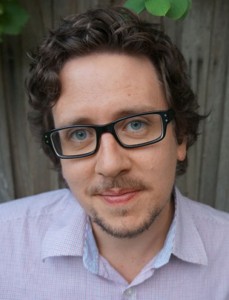Q&A: Ben Keenan on how to be creative on demand

MELBOURNE -- Advertising impresario Ben Keenan has worked at some of the world’s top advertising agencies including M&C Saatchi and Clemenger BBDO. As a creative professional, Ben is passionate about what makes creativity tick, and how it can be taught.
Keenan’s accepted invitations to teach creativity and digital thinking to various tech nights, trained philanthropy professionals at The University of Melbourne’s, and lectured at creative institutions such as Award School and FairFax Copyschool.
He runs a sideline consultancy called The Thought Police, and is on a mission to spruik the merits of creative problem solving beyond the realms of traditional creative industries.
I catch up with him on email to find out what creativity is and how you can get it.

SmartPlanet: What is creativity? Does everyone have it –- Is it something we are born with?
Ben Keenan: When you break it down, creativity is your ability to make new things from whatever is around you. We are all born with it, it’s how we make sense of the world around us and why we choose to discard the toy and play with the box. We do tend to lose that sense of play as we get older, but we never truly lose it, from my experience it’s pretty amazing to see people’s eyes light up when they rediscover it again.
SP: Who is more creative –- a scientist who has created a life-saving drug or a musician who has penned an award-winning song?
BK: Both are creative. In what I have seen, there are two kinds of creativity. Personal creativity is your own voice, like writing a poem, painting or making art. It's where the outcome often proposes a question rather than solves one. Then there is practical creativity, which uses creativity as a tool to simplify, give cultural context, or shift perception to solve a specific problem, this is often in someone else’s voice, the voice of a brand for instance.
SP: According to a Newsweek article, we are in a creative crisis. The Creative Intelligence (Torrance Test Scores) of school students has been in decline since 1990, whereas up until then, they’d been increasing. Do you think we are getting less creative?
BK: I think this is true. Often great innovations come from taking scarce resources, and building new and useful things out of necessity. Today, I think we are dealing with the fact we have access to everything, so we are busy mashing the last 50 years of culture together to make things.
Jaron Lanier, the technologist, pointed this out by saying that it’s impossible to distinguish the year a song was recorded in last 12 years. It’s almost as if every genre has been invented, and that is true of many areas not just music. Maybe it’s all too easy. The trade off of unlimited access to create and share, has resulted in craft and originality getting a little lost. I say this now, but there is probably a kid in his garage right now who has discovered something completely new, that will make everything I have just said completely irrelevant. I hope that is the case.
SP: Can you take us through some of the changes that have been happening in the creative industry?
BK: The rise of online. In the world of ad agencies it was seen as an off to the side specialty for many years, now it's everything, and can be just about anything. I was a web designer before becoming a copywriter, so I’m relieved my shift from new media to old media and back again has worked out OK.
SP: There seems to be a lot of arguments over patents. Who owns an idea? The person who came up with it or the person who was smart enough to patent it?
BK: I think we are living in an era where everything is owned and nothing is owned. Rightfully, the idea belongs to the person who came up with it (or recognized it) but even then, when it's released into the world, any idea is ripe to be recycled, mashed up, extended and exploited, and there really isn't much you can do about that. What makes the notion of protecting ownership more difficult is the rise of patent trolls, organizations that exist to buy very generalized patents, then sue anyone who tries to innovate in that area, they are effectively killing the creativity patents are meant to protect. I think we are going to reach a point where there aren't patents, people are going to come up with ideas, if they are good they will succeed, if someone takes that idea and makes it better, they will then take the lead. There will be a natural selection process that ensures that only the best ideas survive, and legislation is never going to be able to move fast enough to stop this from occurring.
SP: You’re a creative professional -– what does that mean?
BK: I am privileged to have a job where I take everything I see, read and hear and attempt to mash it together and attempt to solve business problems with it. It’s made easier by working alongside some very talented people. It’s an odd job, like a constant apprenticeship. I’m waiting to have someone expose the fact that I’m just making things up as I go along, then I have to remind myself that that is what my job actually is.
SP: Why is it so important to be creative today? Is there a growing demand for creative professionals?
BK: I think there was this 90's slacker idea of having a McJob and just being an inert cog in a wheel, and now we are in this exciting time where individuals are rebuilding how businesses work, to make them more ethical, community focused and sustainable. It's people’s creativity that is fueling this small business culture. So, in order to attract, or retain the best and brightest employees, organizations need to embrace creativity, make it part of their culture and give their employees a sense of autonomy, and the feeling they are contributing to a greater whole.
SP: How does the Thought Police fit in with your work? And where does the name come from?
BK: I’d been creative director on a technology project. We’d just finished and I was asked if I could come back to teach the programmers involved how to come up with application ideas. It was an odd thing to be asked, since creativity is such an internal process, and to be honest, most of the brilliant creative people I have worked with have no idea how they come up with ideas, they just do. I noticed that, so whenever I saw someone who had an approach or techniques to generate ideas I made note of it, mainly for myself. These techniques, and philosophies for want of a better word, have evolved and continue to evolve into the Thought Police workshops.
The Thought Police workshops are as much about improving workplace culture, and teamwork as they are about arming people with useful tools to be able to generate creative solutions to business problems.
The name comes from George Orwell’s 1984, about a dystopian future where even thinking the wrong thing is illegal. As I’ve learned, thinking the wrong thing, and not censoring yourself is all part of the creative process, so the name seemed to fit.
SP: I’ll give a scenario: You’re at work and your manager tells you that he wants three new ideas for a campaign -– what do you do?
BK: I stop myself from blurting out the first thing that pops into my head. That’s what we are programmed to do when we are asked a question. To have the answer right away, and receive praise. Strangely, that is a very hard habit to break, and it’s what gets many people flustered when they are trying to concept ideas.
Usually, I sit down with my creative partner Quentin Millar, and we fill a page with all the different ways into the problem, digging little holes. Then we’ll move on to something else and come back to it in sporadic, but productive bursts. So another page, then another.
SP: Do you have any strategies or tips on how we can be more creative?
BK: Sure, here are five:
1. Get the question right.
Before you consider the possibilities, you need to knuckle down and articulate the problem you are trying to solve in a single sentence. A problem well stated is a problem half solved.
2. Stop yourself from trying to solve things right away.
Years of rote education has drilled the question answer response into all of us.
You need to suppress that part of you that wants recognition and reward, and consider all the ways into the problem. Fill a page full of little boxes and try and put a thought in every box. Not an idea, but a thought, anything and everything that might solve the problem. Your goal is to fill the page, not answer the question.
3. Things won't make sense after a while and that is normal.
We are not wired to consider possibilities when confronted with a problem, we are wired to jump out of harms way, that's why the creative process makes you feel flustered, and like you aren't getting anywhere. Understanding this helps you push through it and just keep going, it’s only after things stop making sense that the really interesting thoughts arrive.
4. Go do something else.
After you've a had a burst for an hour or two, go do an expense report, your time sheets, something that requires your full concentration. While you are applying conscious thought to this task, your subconscious will be sifting through all knowledge you've offloaded about the problem.
5. Keep a pen and paper handy.
Once your subconscious has done its job, the answers will come to you thick and fast. Usually, if we are not having any luck on a solution, I'll just go at it for an hour or so at night, sleep on it, and an idea will come to me while I'm on my way into work the next morning. We all do this without realizing we do it, it’s why your best ideas often happen in the shower.
SP: Lastly, are there any resources / training links for people who are interested in exercising their creative muscle?
BK: There are many, I am a hoarder of them at my Thought Police site and I regularly tweet about them on @warmcola.
Images: Brian Hillegas, Ben Keenan
This post was originally published on Smartplanet.com
